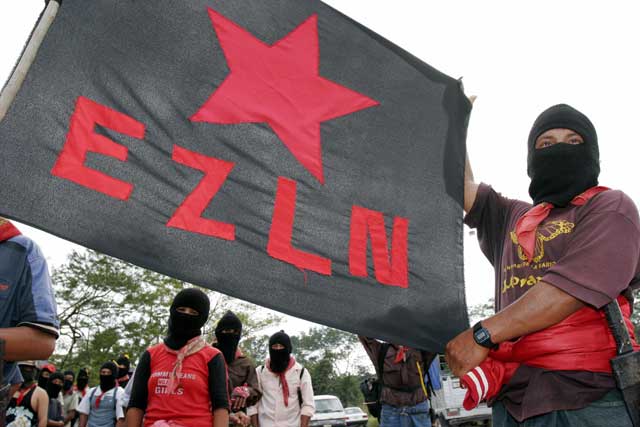What if Latin America Ruled the World?, By Oscar Guardiola-Rivera

Your support helps us to tell the story
From reproductive rights to climate change to Big Tech, The Independent is on the ground when the story is developing. Whether it's investigating the financials of Elon Musk's pro-Trump PAC or producing our latest documentary, 'The A Word', which shines a light on the American women fighting for reproductive rights, we know how important it is to parse out the facts from the messaging.
At such a critical moment in US history, we need reporters on the ground. Your donation allows us to keep sending journalists to speak to both sides of the story.
The Independent is trusted by Americans across the entire political spectrum. And unlike many other quality news outlets, we choose not to lock Americans out of our reporting and analysis with paywalls. We believe quality journalism should be available to everyone, paid for by those who can afford it.
Your support makes all the difference.In the early 1940s, the Uruguayan artist and writer Joaquin Torres Garcia was asking a similar question to the author of What if Latin America Ruled the World? Garcia's answer was cartographic. In his picture America Invertida the continent is switched round so that the Cape Horn is at the top of the world. As Garcia would later write, "because our North is really the South. There should be no North, for us, except in opposition to our South. So we now turn the map upside down, to give us a fair idea of our position, and not as they wish in the rest of the world"
For much of the last 70 years, few have shared this perspective. Through the long years of military dictatorships, civil wars and economic instability, the continent has intrigued the Global North culturally but has remained politically and economically peripheral. However, as Oscar Guardiola-Rivera argues in his book on "how the South will take the North into the 22nd century", things are changing fast. Driven by the gathering storm of economic growth in Brazil, Latin America is clambering its way up the value chain, carving out a new and more empowered place in the global economy.
Simultaneously, and much more important for Guardiola-Rivera, Latin American communities have been exposed to some of the harshest and most unjust consequences of the global economy and have responded by creating the most active and organised forms of resistance to it. From the Landless movement in Brazil to the anti-privatisations protest in Bolivia, from the Mexican Zapatistas to Venezuela's Chavistas, Latin America is at the leading edge of a new era of global resistance to capitalism.
It is from this context the Guardiola-Rivera sets out to write a history of the modern world in which the South is the North. Given, that even in its wildest imagination, Latin America isn't going to be ruling anything soon, the book is rightly not a comprehensive reordering of global history. But in three key areas the author seeks to put Latin America at the centre of the action; first, in an account of economic globalisation that properly starts with the European plunder of Latin America; second, he offers a story of the emergence of modern nations and the associated notions of independence and freedom that reaches beyond the north Atlantic; finally, he sketches the contours of a contemporary global politics that recognises not only the continent's place in the world but also the coming of a Latino majority in the US.
As one might expect the approach to these tasks is eclectic, drawing on archaeology and anthropology, geology and geography, economic statistics and political theory. He leaps from historical reconstruction to theoretical reflection, from global patterns of social change to the narratives of individual lives. The experience of reading it is kaleidoscopic but confusing, enriching but very uneven.
The recasting of conventional theories of globalisation is among the strongest elements, as Guardiola-Rivera insists on the importance of Spanish silver in the emergence of Atlantic capitalism and the enduring importance of violence and war in the creation of Anglo-Saxon empires. Along the way I have been enlightened about the role of 19th-century Latino writers to debates over democracy and of 20th-century Latino economists and sociologists, who have wrestled inventively with the paradoxes and problems the continent's constrained development have thrown up.
However, in this book, the analytical thinking of Latin America's intellectual has only truly born fruit when allied with the continent's deep cultural commitment to common property and the actions of the social movements that continue to embody this. Guardiola-Rivera's account of pre Columbian societies attempts to argue that even in their most stratified and hierarchical imperial forms, they retained a common culture of shared responsibilities and obligations to the natural world and to both ancestors and future generations. It is this that has animated the wave of successful resistance to the worst excesses of global neo-liberalism and will in time create a new constituency for collective solutions and progressive politics in the US.
This is an ambitious book with an ambitious agenda, both are to be applauded. If after reading it my North is still not quite the South, it has helped turn my intellectual compass through a few degrees. The world now looks more complex and more interesting.
However, in its rush to cover so much ground and to challenge so many clichés, I felt that much was left unexamined; the state of gender relations, the pernicious influence of the church, the systemic forms of corruption that plague the continent's polities.
David Goldblatt's global history of football, 'The World Is Round', is published by Penguin
Join our commenting forum
Join thought-provoking conversations, follow other Independent readers and see their replies
Comments